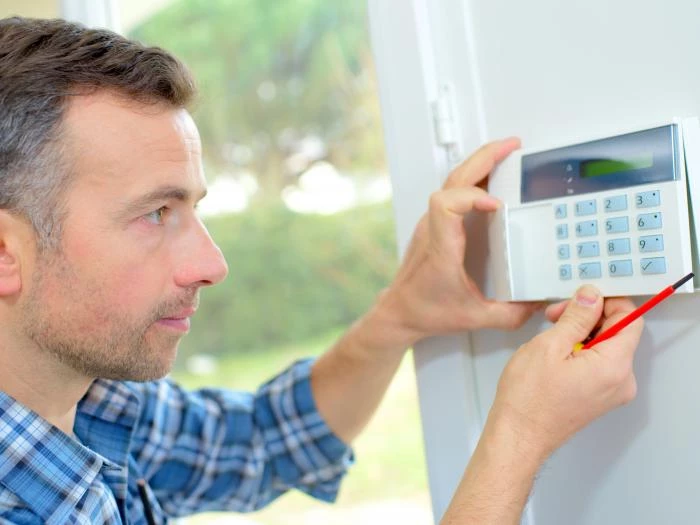Installing a burglar alarm system
Installing a security alarm system at home or business is possible for the handyman with some DIY experience.
But there are drawbacks if you are looking for safe protection for your family or good security for your business.
It is far better to call in the professionals, and Crown Securities can offer a first-class service installing and maintaining burglar alarm systems.
Of course, we would say that, but if you should decide to carry out the project yourself, there are several things to consider.
Your home insurance could be affected by installing a DIY home security system. Businesses could find claims rejected if an approved installer has not set up an intruder alarm system.
With so many DIY kits on the market, you may be tempted to try them yourself, but there are many decisions to be made even before you begin, and you will need to be sure you get them right.
Decide on the best system for you
First is deciding which sort of alarm system you want. They are usually wired or wireless. Wired alarm systems can be challenging to install and require much higher DIY skills. Both types will also need several different sorts of detectors. There are two basic types -- those triggered by movement or those where a contact is broken by opening a door or window. PIR sensors are triggered by body heat or motion, and placement can be problematic. They are suitable for covering larger areas but not much use in confined spaces or near heat sources such as radiators.PIR detectors get less reliable the further they are from the control box. They can be affected by electrical interference by such things as microwave ovens or even large fridges.
Expect false alarms to increase if they point at windows or sit near large metal objects. They are often positioned relatively high in the corner of a room for maximum coverage and higher reliability. Break contact detectors are preferred at vulnerable entry and exit points like doors and windows, but you must decide first which requires the most protection and how many sensors you will need.
Stay in control
No matter which type of sensors you use, they will all need to be monitored by a control box, and that will necessitate both a mains supply and a battery backup. The control panel will need to be accessible, preferably near a mains socket and a telephone point but not so obvious that children can play with it and make sure it is tamper-proof to prevent an intruder from turning the whole system off. A further decision is needed on the type of alarm signal. A prominent audible alarm box sends a clear message to the would-be burglar, but it needs to be challenging to reach, and it may be better to have more than one. More sophisticated systems can send alerts to pre-programmed phone numbers, or specialist agencies can monitor them 24/7.
Make a plan to keep burglars at bay
Drawing up an outline of your home can be a real help in deciding where the vulnerable entry points are, how many detectors you will need, and what type they need to be. PIR sensors can easily be triggered by household pets, so you need a pet-friendly model if you have cats or dogs. It is a good idea to temporarily set up a system and make sure it all works before permanently fixing things. Programme the network and synchronise the sensors with the tamper-proof system disabled, or you will suffer several noisy alarms.
After deciding where the control box will sit, each sensor should be placed in its intended location and tested to ensure it can be detected accurately. If the control box can't 'sense it', there may be a range problem. Don't mount the control box until you are sure all the sensors can be detected. Only then is it time to fix everything in place and carry out a final test.
More ways to protect from intruders
Some would argue that an alarm going off is a signal that your security system has failed as the intruder has already gained entry into your property. You can do many other things to ensure your home and possessions are kept safe. External lights with or without CCTV security cameras, for example, can prove a solid deterrent for would-be burglars. Ensure all doors and windows have decent locks and use padlocks on side entries, garden gates, sheds and garages. Hedges and fences at the front of the house should be kept low to prevent intruders from using them to cover their activities, while thorny plants and hedges under windows can prove to be an excellent deterrent.
There are plenty of devices on the market to switch lights, radios, TVs, etc., on and off while the house is empty to trick intruders into thinking someone is still at home. Remember, safety and security in the home are as much about prevention as a cure. There are plenty of common-sense precautions you can take that cost next to nothing.
How Crown Securities can help
Security Experts at Crown Securities will carry out an evaluation and give free advice on the best type of intruder response alarm system to suit your needs and your budget. Call us now on 01270 666366. Crown Securities UK is NSI Gold accredited – the highest level of NSI accreditation and highly valued across the industry and for the police, fire and rescue services and home and household insurers.
More on burglar alarms
Types of burglar alarm systems
Keeping offices safe and secure
Burglar alarms are good for you
Quick Links
Small Print
NSI Gold / Privacy PolicyAccreditations

Burglar alarms & security systems for the Midlands, the North West & North Wales

